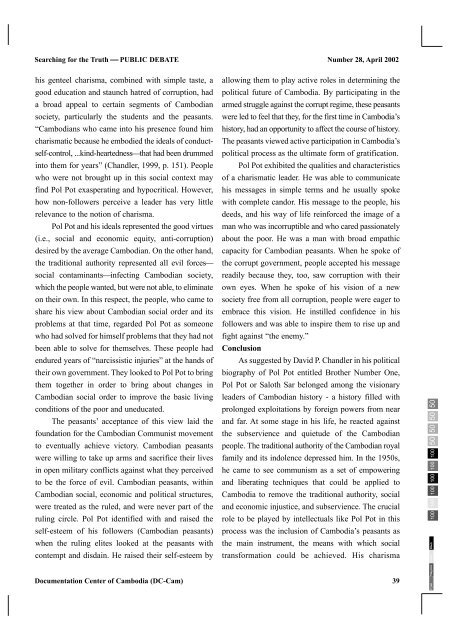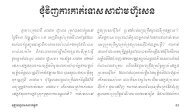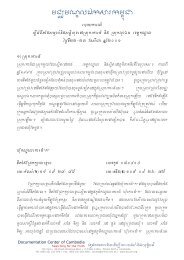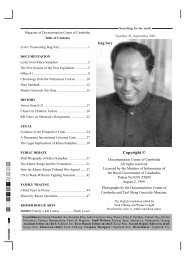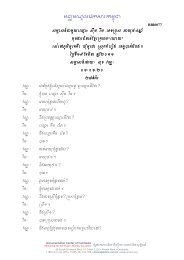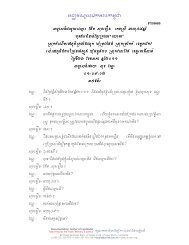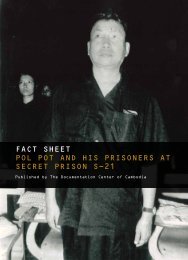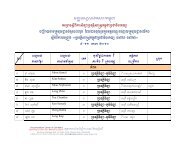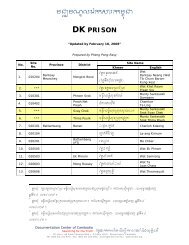Searching for the truth Issues 28 - Documentation Center of Cambodia
Searching for the truth Issues 28 - Documentation Center of Cambodia
Searching for the truth Issues 28 - Documentation Center of Cambodia
You also want an ePaper? Increase the reach of your titles
YUMPU automatically turns print PDFs into web optimized ePapers that Google loves.
<strong>Searching</strong> <strong>for</strong> <strong>the</strong> Truth ⎯ PUBLIC DEBATE<br />
his genteel charisma, combined with simple taste, a<br />
good education and staunch hatred <strong>of</strong> corruption, had<br />
a broad appeal to certain segments <strong>of</strong> <strong>Cambodia</strong>n<br />
society, particularly <strong>the</strong> students and <strong>the</strong> peasants.<br />
“<strong>Cambodia</strong>ns who came into his presence found him<br />
charismatic because he embodied <strong>the</strong> ideals <strong>of</strong> conductself-control,<br />
...kind-heartedness⎯that had been drummed<br />
into <strong>the</strong>m <strong>for</strong> years” (Chandler, 1999, p. 151). People<br />
who were not brought up in this social context may<br />
find Pol Pot exasperating and hypocritical. However,<br />
how non-followers perceive a leader has very little<br />
relevance to <strong>the</strong> notion <strong>of</strong> charisma.<br />
Pol Pot and his ideals represented <strong>the</strong> good virtues<br />
(i.e., social and economic equity, anti-corruption)<br />
desired by <strong>the</strong> average <strong>Cambodia</strong>n. On <strong>the</strong> o<strong>the</strong>r hand,<br />
<strong>the</strong> traditional authority represented all evil <strong>for</strong>ces⎯<br />
social contaminants⎯infecting <strong>Cambodia</strong>n society,<br />
which <strong>the</strong> people wanted, but were not able, to eliminate<br />
on <strong>the</strong>ir own. In this respect, <strong>the</strong> people, who came to<br />
share his view about <strong>Cambodia</strong>n social order and its<br />
problems at that time, regarded Pol Pot as someone<br />
who had solved <strong>for</strong> himself problems that <strong>the</strong>y had not<br />
been able to solve <strong>for</strong> <strong>the</strong>mselves. These people had<br />
endured years <strong>of</strong> “narcissistic injuries” at <strong>the</strong> hands <strong>of</strong><br />
<strong>the</strong>ir own government. They looked to Pol Pot to bring<br />
<strong>the</strong>m toge<strong>the</strong>r in order to bring about changes in<br />
<strong>Cambodia</strong>n social order to improve <strong>the</strong> basic living<br />
conditions <strong>of</strong> <strong>the</strong> poor and uneducated.<br />
The peasants’ acceptance <strong>of</strong> this view laid <strong>the</strong><br />
foundation <strong>for</strong> <strong>the</strong> <strong>Cambodia</strong>n Communist movement<br />
to eventually achieve victory. <strong>Cambodia</strong>n peasants<br />
were willing to take up arms and sacrifice <strong>the</strong>ir lives<br />
in open military conflicts against what <strong>the</strong>y perceived<br />
to be <strong>the</strong> <strong>for</strong>ce <strong>of</strong> evil. <strong>Cambodia</strong>n peasants, within<br />
<strong>Cambodia</strong>n social, economic and political structures,<br />
were treated as <strong>the</strong> ruled, and were never part <strong>of</strong> <strong>the</strong><br />
ruling circle. Pol Pot identified with and raised <strong>the</strong><br />
self-esteem <strong>of</strong> his followers (<strong>Cambodia</strong>n peasants)<br />
when <strong>the</strong> ruling elites looked at <strong>the</strong> peasants with<br />
contempt and disdain. He raised <strong>the</strong>ir self-esteem by<br />
<strong>Documentation</strong> <strong>Center</strong> <strong>of</strong> <strong>Cambodia</strong> (DC-Cam)<br />
Number <strong>28</strong>, April 2002<br />
allowing <strong>the</strong>m to play active roles in determining <strong>the</strong><br />
political future <strong>of</strong> <strong>Cambodia</strong>. By participating in <strong>the</strong><br />
armed struggle against <strong>the</strong> corrupt regime, <strong>the</strong>se peasants<br />
were led to feel that <strong>the</strong>y, <strong>for</strong> <strong>the</strong> first time in <strong>Cambodia</strong>’s<br />
history, had an opportunity to affect <strong>the</strong> course <strong>of</strong> history.<br />
The peasants viewed active participation in <strong>Cambodia</strong>’s<br />
political process as <strong>the</strong> ultimate <strong>for</strong>m <strong>of</strong> gratification.<br />
Pol Pot exhibited <strong>the</strong> qualities and characteristics<br />
<strong>of</strong> a charismatic leader. He was able to communicate<br />
his messages in simple terms and he usually spoke<br />
with complete candor. His message to <strong>the</strong> people, his<br />
deeds, and his way <strong>of</strong> life rein<strong>for</strong>ced <strong>the</strong> image <strong>of</strong> a<br />
man who was incorruptible and who cared passionately<br />
about <strong>the</strong> poor. He was a man with broad empathic<br />
capacity <strong>for</strong> <strong>Cambodia</strong>n peasants. When he spoke <strong>of</strong><br />
<strong>the</strong> corrupt government, people accepted his message<br />
readily because <strong>the</strong>y, too, saw corruption with <strong>the</strong>ir<br />
own eyes. When he spoke <strong>of</strong> his vision <strong>of</strong> a new<br />
society free from all corruption, people were eager to<br />
embrace this vision. He instilled confidence in his<br />
followers and was able to inspire <strong>the</strong>m to rise up and<br />
fight against “<strong>the</strong> enemy.”<br />
Conclusion<br />
As suggested by David P. Chandler in his political<br />
biography <strong>of</strong> Pol Pot entitled Bro<strong>the</strong>r Number One,<br />
Pol Pot or Saloth Sar belonged among <strong>the</strong> visionary<br />
leaders <strong>of</strong> <strong>Cambodia</strong>n history - a history filled with<br />
prolonged exploitations by <strong>for</strong>eign powers from near<br />
and far. At some stage in his life, he reacted against<br />
<strong>the</strong> subservience and quietude <strong>of</strong> <strong>the</strong> <strong>Cambodia</strong>n<br />
people. The traditional authority <strong>of</strong> <strong>the</strong> <strong>Cambodia</strong>n royal<br />
family and its indolence depressed him. In <strong>the</strong> 1950s,<br />
he came to see communism as a set <strong>of</strong> empowering<br />
and liberating techniques that could be applied to<br />
<strong>Cambodia</strong> to remove <strong>the</strong> traditional authority, social<br />
and economic injustice, and subservience. The crucial<br />
role to be played by intellectuals like Pol Pot in this<br />
process was <strong>the</strong> inclusion <strong>of</strong> <strong>Cambodia</strong>’s peasants as<br />
<strong>the</strong> main instrument, <strong>the</strong> means with which social<br />
trans<strong>for</strong>mation could be achieved. His charisma<br />
39<br />
100 100 100 100 100 100 50 50 50 50<br />
Black<br />
Yellow<br />
Magenta<br />
Cyan


